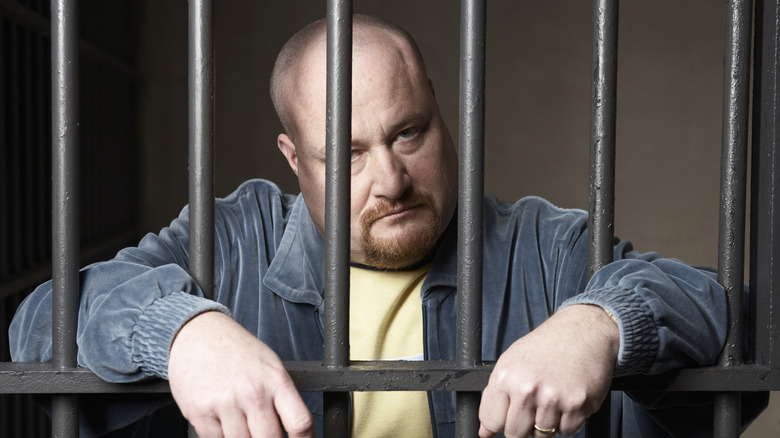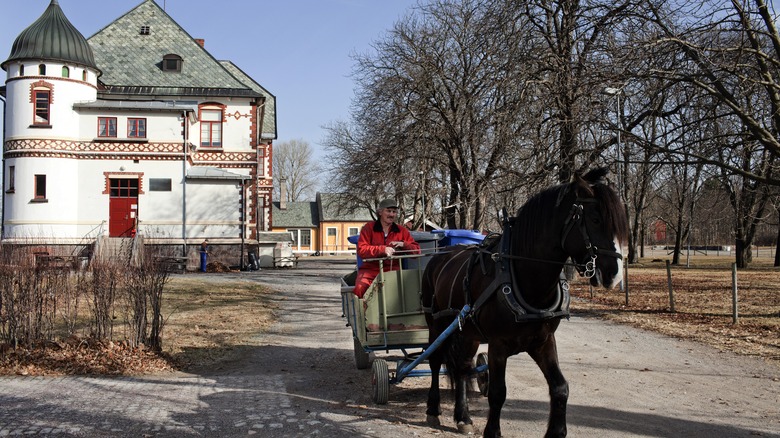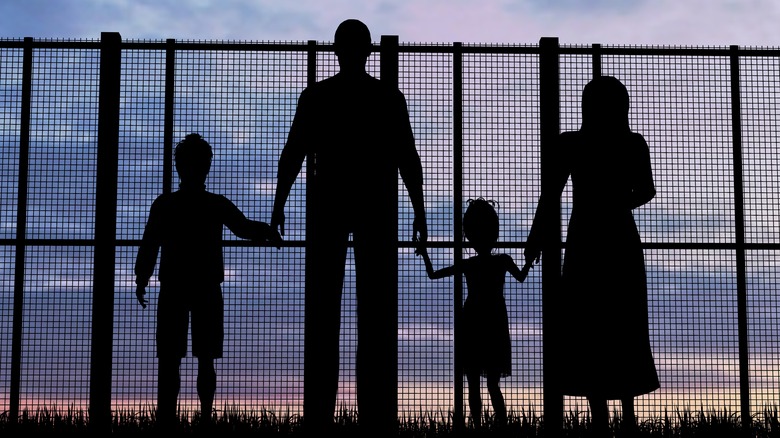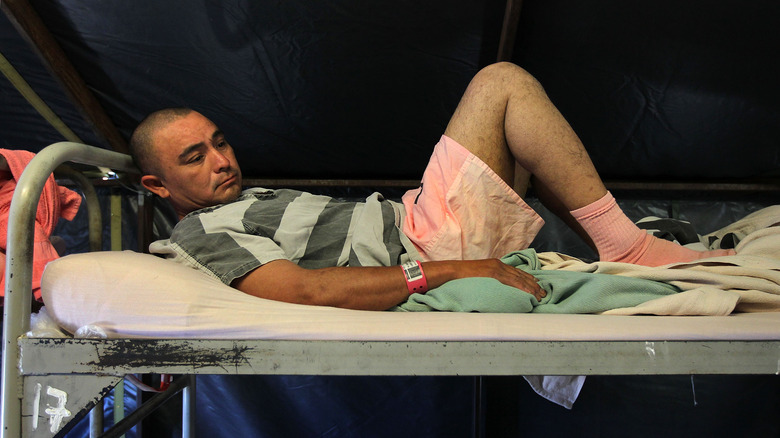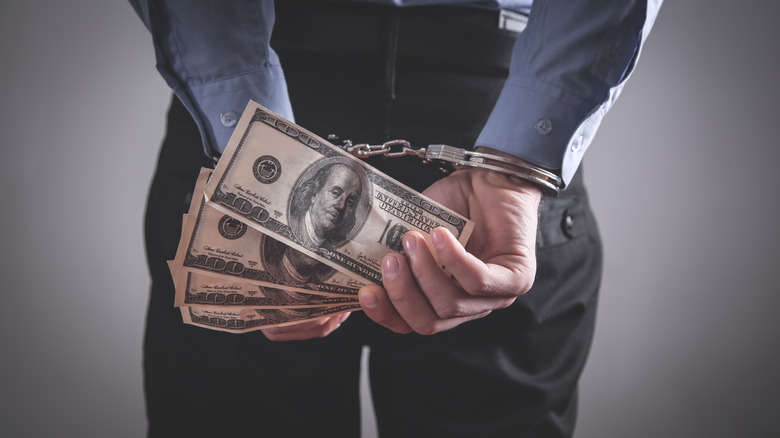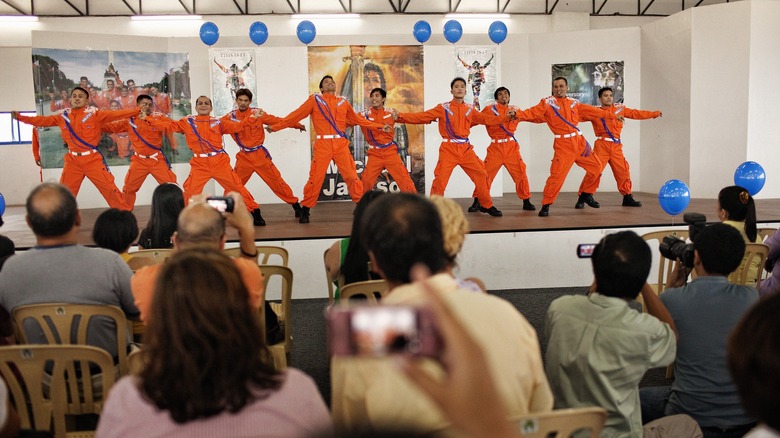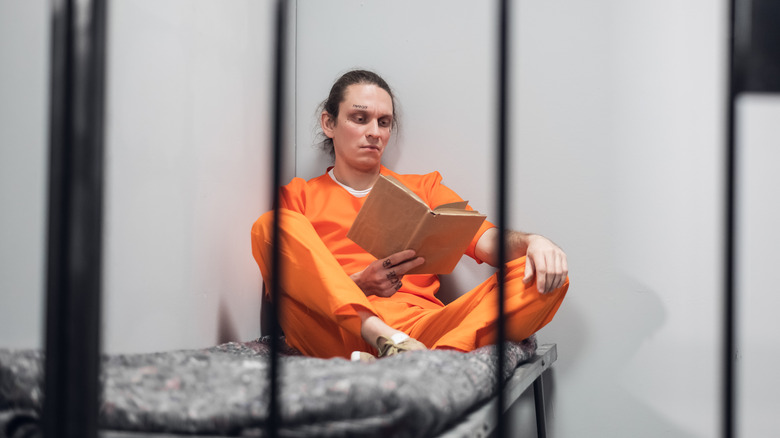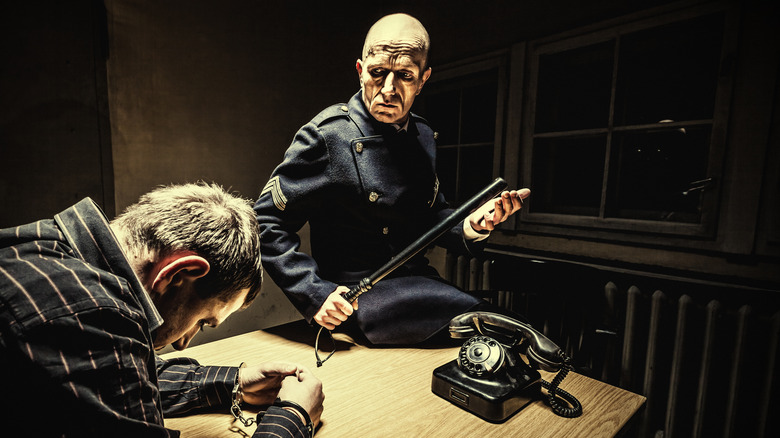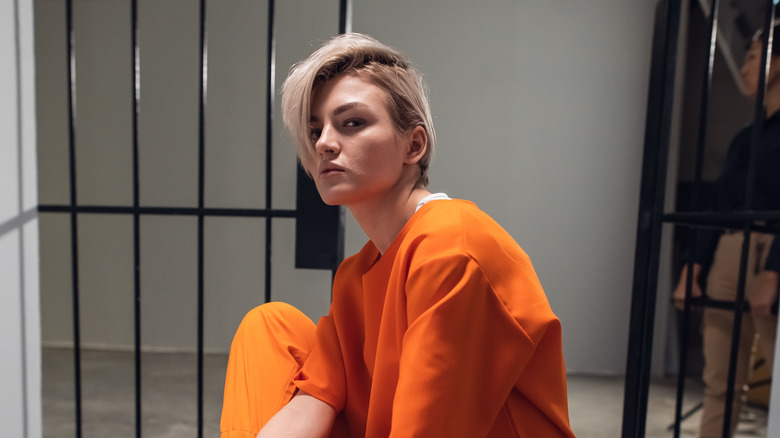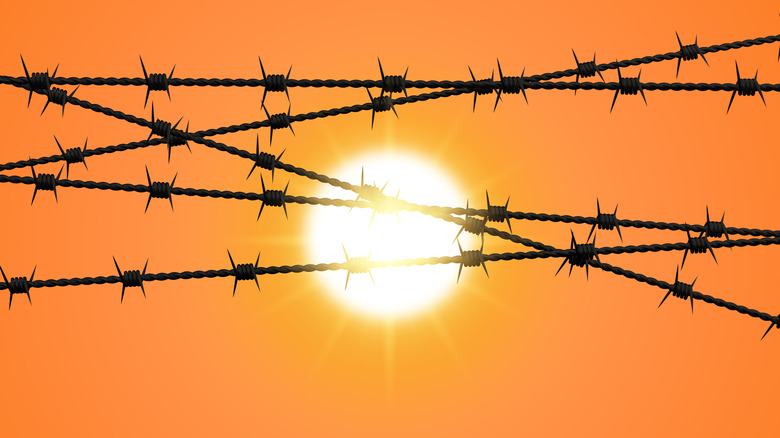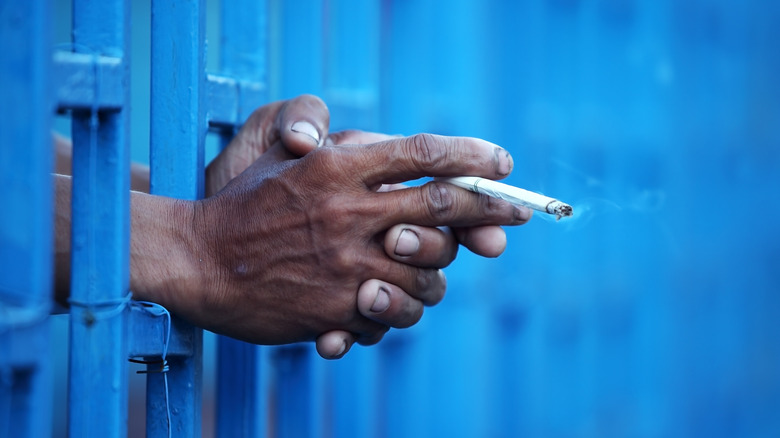Weird Prison Rules You Never Knew Existed
Everyone knows what prisons are, but unless you've had the misfortune of spending time inside one, there's a good chance that your main source of information about what exactly goes on inside a correctional facility comes from popular culture. Granted, that might be enough to get the gist of cells, guards, rules, dinner times, prison yards, and how a strict set of rules governs everything. However, that's just scratching the surface. Depending on the prison facility an inmate ends up doing time in, the reality can be much weirder — in one way or another.
The thing about prison rules, you see, is that they can change from country to country, and even from prison to prison. Some facilities subject prisoners to rules that can be downright horrible, while others can seem almost whimsical. Because of the different ways various prisons handle their inmates, this can lead to some seriously weird rules that you're unlikely to see in TV shows and movies. Here's a look at some of the strangest prison rules out there, and how they affect the prisoners and the prison staff.
Bastoy Island: rule of trust and respect
It's easy to assume that a virtually unguarded island where dangerous criminals like murderers roam in comparatively luxurious conditions would be destined to end up on a list of the most dangerous prisons in the world. However, Norway's Bastoy prison island is anything but hazardous to one's health.
Bastoy operates wholly on trust and respect. The guards are unarmed. The inmates live in cabins where they have their own rooms, cook and grow much of their food, and work various jobs around the island ... up to and very much including operating the ferry between Bastoy and the mainland. They even have access to a tanning bed. "It's like living in a village, a community," one inmate told The Guardian. "Everybody has to work. But we have free time so we can do some fishing, or in summer we can swim off the beach. We know we are prisoners but here we feel like people."
The reason behind Bastoy's comparatively palatial conditions is that the island is preparing the inmates for the day when they've served their sentences and become free men. While they're trusted to largely govern themselves, the authorities are still watching them — and the inmates are carefully chosen from a pool of prisoner applicants who are deemed to be genuinely willing to change their ways. It's not the most conventional prison in the world, but it has a reasonable claim for being the most humane one.
Aranjuez prison: cells for the whole family
What happens to a child in the extremely unfortunate occasion where both of their parents go to prison? If the parents happen to be incarcerated in Spain's Aranjuez prison, the answer is simple: The child can simply live with them in a big family cell.
Don't worry, the situation is healthier than you might think. The prison isn't taking teenagers and 10-year-olds and locking them in with a bunch of hardened criminals. Instead, Aranjuez prison's family cell program only applies to children under the age of 3. If both of their parents still remain incarcerated after they reach that age, the child is sent to live with relatives. Until then, however, the family gets to live in the facility's roomy family cells, complete with toys and most of the amenities of a regular household with a young child. Since there are several family cells in Aranjuez, there are also several children living in these conditions, so there's no shortage of playmates, either.
While the prison environment is obviously not the greatest for a young child, experts nevertheless consider this method preferable to infants growing up without their parents. However, for one reason or another, Spain hasn't expanded the family cell system beyond Aranjuez.
Maricopa County: mandatory pink underwear for inmates
In all fairness, forcing prisoners to wear pink underwear isn't an all-encompassing correctional complex strategy in the United States. Instead, it's one of the more visible parts of the tenure of Joe Arpaio, the Sheriff of Maricopa County, Arizona. Arpaio has embraced the nickname "America's Toughest Sheriff," and during his tenure, he established measures that civil rights organizations had plenty to say about. He's been called out for everything from racial profiling to oppressing minorities.
One of Arpaio's stranger policies was the pink underwear campaign. Maricopa County's jails originally distributed regular white underwear to its inmates, but after the sheriff found that those were disappearing, he changed the color of all inmate-issued underwear to pink as a theft deterrent. This also applied to blankets, socks, undershirts — and even handcuffs. Combine this with the fact that many of the incarcerated people in Maricopa County were serving their sentences in an outdoor jail called Tent City — another Arpaio creation — and the visual effect could be strange, to say the least.
Even in Maricopa County, the era of the pink undergarment was ultimately fairly short. When Arpaio's successor Sheriff Paul Penzone was elected in 2016, he soon started doing away with his predecessor's policies, including the pink underwear. As for Arpaio himself, he went on to receive one of the most controversial presidential pardons in history when Donald Trump pardoned him in 2017 ... before Arpaio even received his sentence for criminal contempt of court related to illegal racial profiling practices.
San Pedro prison: cells for sale
One thing a prisoner wouldn't necessarily expect to be able to influence is the cell they spend their jail time in. Countless movies and TV shows have taught us that when you end up in prison, you're taken to a cell that's been pre-selected for you, and that's that — at least, unless you get transferred or behave badly enough to warrant solitary confinement.
In San Pedro prison, things are different. The facility is located in La Paz, Bolivia, and is notorious for looking pretty much like every other impoverished neighborhood in the area, complete with shops, services, and even whole families. The only difference is that the entire area is surrounded by decidedly prison-like walls. However, the relative luxury of an everyday environment comes at a price ... literally. The more money a prisoner is willing or able to pay, the better area they live in, and the nicer cell they get. The more luxurious cells are comparable to hotel rooms or apartments, and the areas they're located in have all sorts of amenities you'd expect from a nice rustic neighborhood. Conversely, the poorer prisoners live in far worse conditions.
Both the need to make ends meet and the demand for goods and services has created a fairly complex economy inside the prison walls, with people specializing in specific jobs just as they would outside the prison. Since there are no guards within the walls, the prisoners also effectively govern themselves.
Cebu prison: Mandatory choreographed dancing training
In some countries, dancing in the wrong place can potentially land you a prison sentence. In others, prison is where the dancing really begins. In 2008, the dancing rehabilitation program of the Cebu Provincial Detention and Rehabilitation Center in the Philippines introduced itself to the world with a viral video of the inmates dancing to Michael Jackson's "Thriller." This wasn't a one-off performance, but instead part of a program that security consultant Byron Garcia introduced in 2007 to keep the prisoners active and cull violent incidents as part of a larger reform of the facility. It was originally Garcia who put the prisoners' performances on YouTube in an effort to raise awareness of the program's success — in other prisons, not among the general audience. However, the public enjoyed the cool performance, and the main couple in the "Thriller" video, inmates Crisanto Niere and Wenjiel Resane, soon found internet fame.
The prisoners' dance drills last up to four hours a day, and include elaborately choreographed mass dances that fill the prison yard with action. "There's a time to dance and a time to sing," Patrick Rubio of the Philippines' Bureau of Jail Management and Penology told ABC News. "If they say laughter is the best medicine, how much more for dancing?"
Apart from viral videos, the program has led to public performances and even inspired a musical. It has been successful enough that as of 2023, the mass-dancing sessions were still going strong.
New York prison system: the strangest book restrictions you've seen
The U.S. prison system is somewhat infamous for banning books in correctional facilities. Since there are no overarching guidelines about censoring reading materials, pretty much any- and everything can be questionable. While there are many specific books that are banned — Florida alone has over 22,000 — even a book that isn't on the list of forbidden titles might not reach the hands of an inmate who'd like to read it. On occasion, something as simple as the book's physical size or the color of the package it's mailed in can make it unacceptable.
Out of the many limitations states have imposed on their reading-minded prisoners, the "Secure Vendor Program" New York piloted in 2018 might be among the strangest. The policy initially ruled that only items from carefully vetted vendors could be mailed or gifted to inmates. However, as author Molly Crabapple pointed out on X, formerly known as Twitter, the actual selection was debatable. "They offer 5 junk sex novels, 14 bibles & religious books, 24 drawing/coloring books, 21 puzzle books, 11 guitar/chess/how-to books, 1 dictionary, 1 thesaurus," Crabapple wrote (via Newsweek). "No other books can be sent in." What's more, the approved vendors' prison prices were considerably higher than usual.
Fortunately, the state soon reworked the program to offer more selection. Unfortunately, when it introduced an updated version of the Secure Vendor Program in 2022, the new pilot program immediately cost prisoners their access to most homemade care packages from their loved ones.
Yaroslavl, Russia: heavy metal initiation
It may not come as a surprise that life in a Russian prison isn't exactly a walk in the park. From Kremlin critic Alexei Navalny to Brittney Griner's prison sentence after the WNBA star was detained in 2022, many individuals have experienced life in the country's prison system. The conditions can be nasty even in one of the nicer facilities, and for the poor souls who end up in some of the more horrifying penal colonies, life can be outright brutal. Sometimes, even the obligatory initiation sequence can be awful.
In Yaroslavl prison near Moscow, prisoner deaths and violence are commonplace, and the arrivals find out very quickly what kind of establishment they're entering. The so-called "intake" ceremony is an elaborately constructed, systematic type of violent hazing that takes place in a narrow, low hallway that leads to a cramped room. New inmates are ushered into the room, where they're beaten to within an inch of their lives while heavy metal plays in the background.
The method behind the madness — such as it is — is all about control. By breaking the new inmates in like this, the guards establish dominance. This particular prison rule isn't completely unregulated, since a guard who kills a prisoner this way may be subjected to an investigation. Regardless, "intake" is a terrifying part of life in Yaroslav prison that most prisoners would probably be more than happy to skip.
Texas prison system: solitary gowns on female prisoners
From the strange things solitary confinement does to your body to the mental toll it takes, getting involuntarily isolated for a prolonged period of time is no joke. The lack of exercise and activity can cause acute pain, trembling, and cardiovascular problems, and there are many other physical and mental issues associated with solitary confinement. The experience can be so overwhelmingly awful that it can lead to suicide.
For reasons that baffled even experts, the Texas Department of Criminal Justice added another, quite literal layer of discomfort to female inmates in solitary confinement. The state's prisons had been dressing these prisoners in white gowns, as opposed to the more traditional prison uniforms their male counterparts received. What made the situation even stranger was that the prison only provided the gown, underwear, and socks. While other items of clothing were available, the inmates had to pay for them. In other words, if you didn't have the money, it meant you couldn't have pants, boots, or even shower towels.
Experts couldn't figure out any possible reason to enforce the gown policy, aside from the possibility of the gowns being a means to deliberately humiliate the inmates. "To my knowledge, this is the only state that I have heard of this," University of Colorado criminology professor Vivian Aranda-Hughes told Texas Public Radio. "This is the first time I'd ever heard of this." The peculiar gown policy finally ended in 2023.
If you or someone you know is struggling or in crisis, help is available. Call or text 988 or chat 988lifeline.org
Various states: air conditioning rules (or lack thereof)
Sometimes, the strangest rule is an absence of rules — and during the hot months, many U.S. prisoners find out firsthand just how strange and horrible it is that their prisons don't have air conditioning. Despite assorted court rulings that prisons can't subject inmates to extreme heat or cold, a large number of U.S. prisons have no air conditioning whatsoever. In 2019, 13 Southern states had no air conditioning in their prisons, and some estimations indicate that as of 2023, as many as 44 states had at least some prisons without A/C.
Living through a hot summer without air conditioning is even worse in prison where inmates have no way to seek refuge from the heat. People pass out, flood their cells in desperation, and even die of heat stroke. The heat can also cause problems with their internal organs, which can lead to serious medical conditions.
While prisoners are particularly vulnerable to the situation given their uncertain access to methods of cooling, the situation also affects the prison staff, who are understandably wary of working in conditions that subject them to extreme heat. "The truth is the state is paying millions of dollars a year in heat-related lawsuits and we're facing chronic corrections-officer shortages," Texas State Representative Terry Canales described his state's prison air conditioning situation to The New York Times. "Being in prison in and of itself is a punishment. But nobody is signed up to be tortured."
Pennsylvania prison system: no tobacco products for anyone, period
In popular culture, cigarettes and prison go hand in hand, and even if you don't smoke, they're good for currency. The same applies to real life, and even prisons that have restricted smoking have dealt with the ensuing tobacco black market. Still, cigarettes aren't exactly good for anyone's health. In 2022, the World Health Organization deemed prison smoking a major public health issue and estimated that up to 90% of prisoners use tobacco products.
Some prisons around the world have addressed the issue with various bans and prohibitions, but few have gone as far as the Pennsylvania prison system. In 2019, the state introduced a total ban of any and all tobacco products — as well as pipe cleaners and other equipment that can be considered paraphernalia. Perhaps the strangest thing about this rule is that it applies to absolutely everyone, from the prisoners themselves to the prison staff.
Of course, Pennsylvania's prisons didn't force every staff member and inmate to quit smoking entirely cold turkey. The ban was announced a few months before the prisons started to implement it in July 2019, and prisoners were offered support programs. Certain types of e-cigarettes were also still allowed, albeit their use was heavily restricted to certain areas. Still, with entire prisons quitting smoking — and having to finance their nicotine patches themselves — it's easy to imagine that things were a bit tense in the state's correctional facilities that summer.
